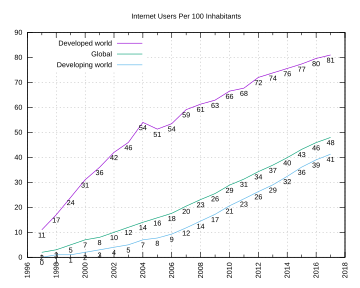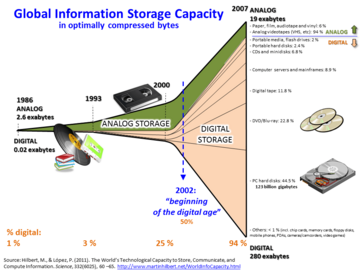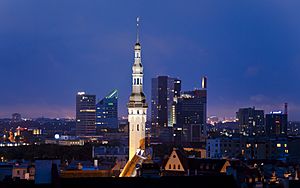Information society facts for kids
An information society is a place where creating, sharing, and using information is super important. Think of it as a society built around information! This change is mostly thanks to information and communication technologies (ICTs), like computers and the internet.
These technologies are changing almost everything. They affect how we learn, how we earn money, our health, how governments work, and even how much democracy we have. People who are good at using these technologies are sometimes called digital citizens. They use the internet often and well. This idea suggests that we are living in a new and different time for human society.
This big change can be seen in technology, how our economy works, the types of jobs people have, where people live, and even our culture. An information society is often seen as what comes after an industrial society. Other similar ideas include the knowledge society and the network society.
Contents
What is an Information Society?
It's tricky to agree on one exact meaning for "information society." Most experts think this big change started around the 1970s. It continued through the 1990s and 2000s, shaping how the internet works today. This change is still making societies work very differently.
Information technology is more than just the internet. Its ideas and uses affect many other areas of life. Frank Webster, a sociologist, says there are five main ways to look at an information society:
- Technological: How much technology is used.
- Economic: How much money comes from information.
- Occupational: How many jobs involve information.
- Spatial: How information affects where people live and work.
- Cultural: How information shapes our culture.
Webster believes that information has changed how we live today. Our lives now often revolve around knowledge and information. In 2005, governments agreed to support the idea of an Information Society. They wanted to make sure everyone could use ICTs for development.
Some people, like Antonio Negri, say that in an information society, people do "immaterial labour." This means they create knowledge or cultural things, not physical products. One challenge is that this society still needs physical things to work. For example, you need computers and servers for the internet to exist.
How Information Has Grown
The amount of information we create and store has grown a lot. We can measure this by how much information we can store, share, and process.
For example, in 1986, the world could store about 2.6 exabytes of information. That's like less than one 730-MB CD-ROM for every person. By 2007, this grew to 295 exabytes! That's like 60 CD-ROMs per person. This shows a huge growth of about 25% each year.
The ability to send information through one-way broadcasts, like TV, was huge. In 2007, it was like 174 newspapers per person per day. Our ability to exchange information through two-way networks, like phones and the internet, also grew massively. In 1986, it was 281 petabytes. By 2007, it was 65 exabytes. This is like 6 newspapers per person per day.
Computers have also become incredibly powerful. The world's ability to compute information grew over 60% per year from 1986 to 2007. This rapid growth shows how much more information we can handle now.
How the Idea of Information Society Developed
One of the first people to think about the information society was Fritz Machlup. In 1962, he wrote a book called The Production and Distribution of Knowledge in the United States. He looked at how much of the US economy came from "knowledge industries." These included education, research, media, and information technologies.
Many other ideas have been discussed about how technology changes society. These include the knowledge economy, post-industrial society, and network society.
Changes in the Economy
Peter Drucker suggested that our economy is shifting. It's moving from making physical goods to creating and using knowledge. Marc Porat divided the information economy into two parts:
- Primary sector: Companies that directly produce or process information goods and services.
- Secondary sector: Companies that use information services for their own needs, like a government office using computers.
The OECD (Organisation for Economic Co-operation and Development) used Porat's ideas. They defined an information society as one where more than half of the country's wealth (GNP) comes from information industries. Also, more than half of the workers are in information-related jobs.
Daniel Bell also focused on jobs. He said that in a post-industrial society, most people work in services and information. What matters most is information, not physical strength or energy.
Alain Touraine talked about a "programmed society." He meant that society itself becomes involved in creating its own management, production, and distribution systems. This includes areas like information, health, and education.
Jean-François Lyotard believed that "knowledge has become the main force of production." He said knowledge turns into something that can be bought and sold. He thought that information technologies would spread knowledge to everyone.
Manuel Castells introduced the idea of the network society. He said that in the Information Age, important parts of society are organized around networks. These networks are the new way society is structured. They change how we produce things, how we experience life, and how power and culture work. For Castells, the network society is a result of "informationalism," a new way technology shapes society.
Criticisms of the Information Society Idea
Some experts, like Frank Webster, criticize the idea of a completely new "information society." They argue that it makes it seem like today's society has nothing in common with the past. They say this view might make people think they can't change things.
These critics believe that society is still mainly a capitalist society. It's still focused on making money and gaining power. They agree that information and globalization are important new features. But they argue these are still part of the larger capitalist system. Webster suggests we are in an "informational capitalism" era.
Other scholars use terms like:
- Transnational network capitalism: This means global networks of companies and people use digital tools to gain wealth and power.
- Digital capitalism: This highlights how digital networks spread the capitalist economy more widely than ever before.
- Virtual capitalism: This focuses on how marketing and new technology help companies make more money and become bigger.
These ideas all agree that computers and information technology have changed how capitalism works. They have made the economy more global.
Antonio Negri and Michael Hardt talk about "immaterial labour." This is work that creates things like knowledge, information, or feelings, not physical products. They say this type of work is important in today's capitalism.
Overall, these different ideas show that experts are still debating what to call our modern society. They discuss the role of technology, information, and communication. The study of the information society is a key part of modern sociology.
Sociological Uses
In sociology, an informational society is seen as a type of post-modern society. Experts like Ulrich Beck, Anthony Giddens, and Manuel Castells believe that since the 1970s, societies worldwide have changed from industrial to informational.
Just as steam power drove the industrial society, information technology is seen as the main force behind changes today. These changes affect how we work, how society is structured, and how politics operates.
In his book Future Shock, Alvin Toffler used the term super-industrial society for this type of society. Other thinkers have used similar terms like "post-industrial society."
Related Terms
Many terms describe different parts of our new global economy.
- The Information Society is a broad term. An economy is just one part of a society.
- The Information Age usually refers to a specific time period.
- The knowledge economy focuses on the content itself, like intellectual property.
- Electronic commerce and electronic business are about buying, selling, and running businesses online.
- The digital economy is about trading digital information, not physical goods.
- The network economy highlights how businesses work together in networks.
- Social networking is about people collaborating on a huge scale.
All these terms describe different features of our changing society. They show how economic activity is becoming more focused on information and networks. Sometimes, to get more knowledge, things like surveillance are used.
Intellectual Property and Information Society
One interesting challenge in an information society is that information is very easy to copy. This leads to questions about intellectual property (IP). Businesses that create and sell information, like music or software, want to control it. This helps them make money.
However, controlling information can be hard. It's often easy to copy digital content. Also, people in an information society might not want all information to be bought and sold. They might believe some information should be free to use and share.
To deal with this, some countries have laws like the Digital Millennium Copyright Act. These laws make it illegal to get around copy protection (called DRM). On the other hand, movements like free software and open source encourage sharing information freely. They believe information should be "gratis" (free of cost) and also offer "liberty" (freedom to use, explore, and share).
It's important to remember that when politicians talk about "information society," they might just mean "everyone uses the internet now." But the sociological term "information society" means deeper changes in how society is built. We need to understand these changes better to make good decisions about how information is used and shared.
See also
 In Spanish: Sociedad de la información para niños
In Spanish: Sociedad de la información para niños
- Cyberspace
- Digitization
- Digital transformation
- Information culture
- Information industry
- Information revolution
- Internet culture
- Network society
- World Summit on the Information Society (WSIS)
 | John T. Biggers |
 | Thomas Blackshear |
 | Mark Bradford |
 | Beverly Buchanan |




